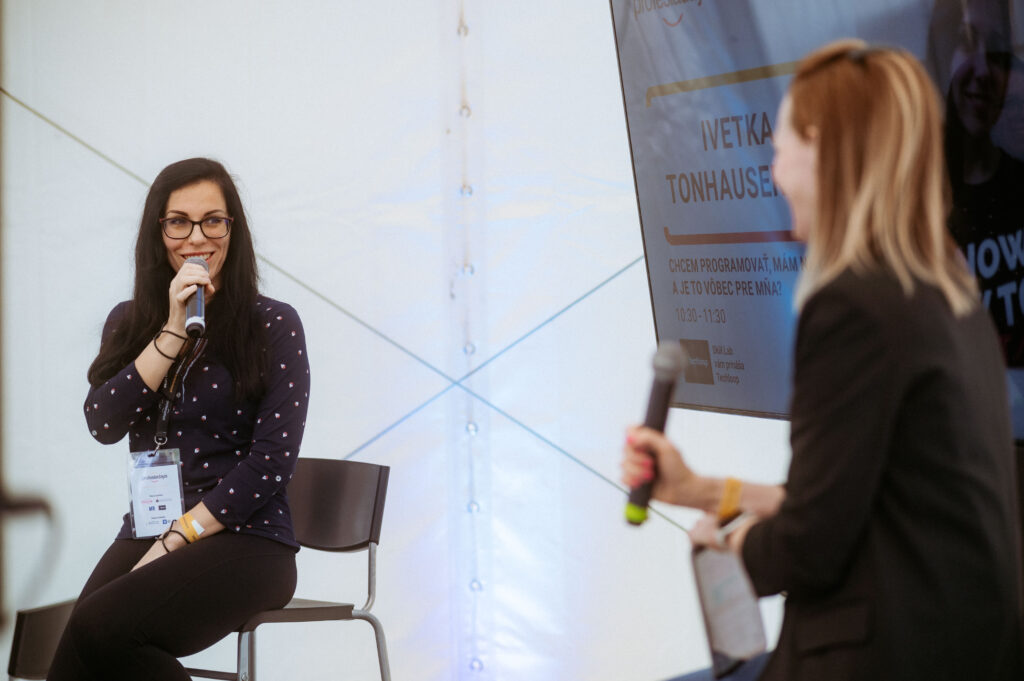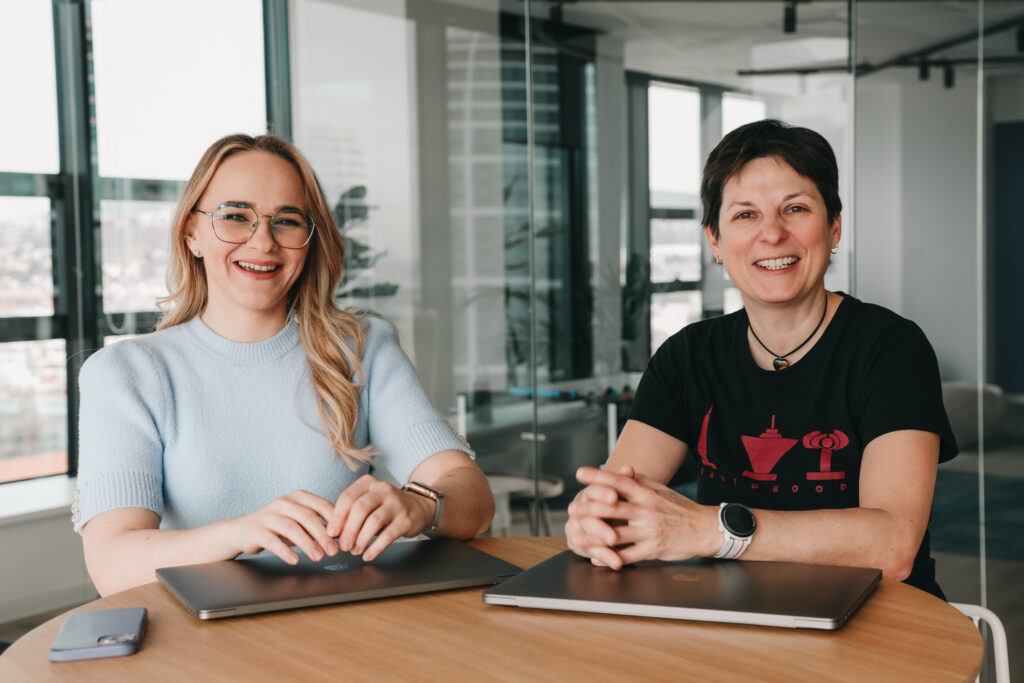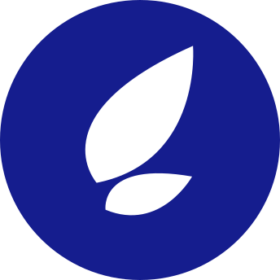Step into the dynamic world of technology as our colleagues Gabika (Data Engineer), Helenka (Software Engineer), Andrea (BI Analyst), and Ivetka (Senior Software Engineer) open the doors to their unique experiences in the industry. In this special interview for International Women’s Day, we delve into their unique journeys, uncovering key moments, challenges, and successes. Join us on a journey highlighting not just their technical skills but also the perseverance and enthusiasm shaping the roles of women in technology.
Can you share a bit about your journey into the tech industry and what initially sparked your interest in this field?
Gabika: When I was 6 years old, my uncle built our first computer at home. I remember how fascinating it was, how all the small parts worked together. I didn’t know how to use it, so each time I returned from school I just flipped the switch, and I was waiting to see something colorful on the screen. Then I started my 8-year studies at high school in Liptovsky Hradok focused on IT at the age of 10. I found it easy to learn Mathematics, Physics, and Informatics because everything related to these subjects was based on logical thinking. That time I didn’t see myself as a girl in IT.
Helenka: I worked as a back-office employee in one of the largest Austrian banks. My role involved internal payment transactions and taking care of transit accounts. While it initially seemed interesting, the typical 9 to 5 office routine and repetitive tasks left me yearning for something more exciting. The tech industry offers a lot of possibilities and flexibility, every day I can learn something new and avoid the routine at work.
Andrea: From a young age, I found joy in solving logical puzzles and unraveling complex problems. This combined with my analytical thinking naturally led me towards the tech industry. Growing up in the ’90s, I wasn’t exposed to technology as much as kids are nowadays. I had to wait until university to fully understand which career path I wanted to take. It took perhaps three or four courses on databases, statistics, and programming to motivate me to pursue a career in this field.
Ivetka: I got into the tech field by accident, primarily inspired by a friend who applied for computer science, assuming that, given our proficiency in math and physics, it could be fun. Consequently, my path in tech has been quite straightforward, as I graduated in computer science and have been immersed in it ever since. Additionally, the influence of my father, a computer enthusiast, played a role as I grew up in an environment where computers and the internet were still considered rarities. It seems to be in our DNA, considering my sister is also in computer science :).

What advice would you give to other women aspiring to pursue a career in technology?
Ivetka: First of all, individuals should consider whether they genuinely enjoy this field and if it will fulfill them in the long term. The current boom portrays reality in a simplistic way, and paradoxically, the beginnings are the most pleasant aspect. From my perspective as a programmer, only those who are truly committed and accept that it involves hard work, continuous learning, and retraining throughout their career will thrive in this field. Tech is becoming more complex every year, and the pace of development is accelerating.
Will you still enjoy reading tutorials and studying technical documentation in your spare time 10-20 years from now? Will you be willing and able to balance it with your personal and family life? These are topics that few people discuss, and in my experience, they are the reason why many women leave a development career after a while, even if they initially start one.
Gabika: “Never give up.” and “Obstacle is the way.”. Maybe it sounds like a cliché, but discipline, endurance, and healthy self-love are the first key. The second key is to find people who are better than you, ask them questions, and listen to what they say. I am so thankful for having great people around me.
In your experience, how has the tech industry evolved in terms of diversity and inclusion, and what improvements would you like to see in the future?
Andrea: I feel that the tech industry is a leader in the understanding that it doesn’t matter who you are, how you look, who you love, what you wear but it is what you can accomplish and create that matters.
Helenka: I would like to see more young girls interested in studying technology. Therefore, we need to promote the idea that technologies are not just for boys, and there are plenty of opportunities for everyone to excel. Additionally, I would like to see more women in managing positions.
Can you discuss a project or accomplishment you are particularly proud of in your career and the lessons you learned?
Ivetka: I am most proud of the projects I have done pro bono as part of my volunteer work, specifically the websites that have significantly helped the organizations. For instance, I worked intensively on the Animal Freedom website for several months. It has received excellent feedback, garnered substantial traffic, and, most importantly, contributed to an initiative close to my heart. This type of meaningful work is incredibly fulfilling, and I hope to engage in more projects like this in the future.
Helenka: In the process of developing a mobile app and tasked with preparing a demo for the product team, I discovered a method to present the mobile screen live. The product team was genuinely impressed, given their anticipation of merely a few screenshots or videos. I was delighted to have exceeded their expectations by raising the bar higher.
How do you stay motivated and continue learning in a rapidly changing tech landscape?
Helenka: I follow some interesting profiles on social media (TechCrunch, Bernard Marr, Marques Brownlee) and they post about new technologies or methods daily. Also in my job, I like the opportunity that I can take on a challenging task and nobody is rushing me when it will be done. Taking challenges is a good way how to step out of your comfort zone and learn something new.
Gabika: No one can cover each technology in the world and be an expert in it. Here are my recommendations:
- Find the area of your interest.
- Watch, listen, and talk with the experts around your interest, as they will point out what’s essential to know and where you can learn.
- Start learning, but don’t begin too many different courses simultaneously. From my experience, it’s more efficient to stay focused on one topic. You become more immersed in it and gain a better grasp of the subject.
- Make notes, apply your newly earned skills in exercises, discuss what you have learned, and finish the course.
- Try to apply your newly gained knowledge to solve real-world problems.
- Usually, after completing all of the above, I can find the next improvement area that I want to focus on.
- Be disciplined and patient, one day you will see the results of your hard work.

What role do mentorship and networking play in your career, and how have they contributed to your growth?
Helenka: For me, mentorship is really important for professional growth. I like to get feedback (even if it’s not exactly positive), it helps me to stop and think more about how to make it better next time.
Ivetka: Speaking of networking, it is very important, and has helped me secure almost every quality project in my career. I can hardly imagine my business without it. Therefore, I recommend not underestimating its value and seizing every opportunity to develop it.
In your opinion, what skills and qualities are essential for success in technology, regardless of the specific role?
Gabika: I consider humility the most crucial quality because, without this virtue, everything is in vain.
Helenka: Being eager to constantly learn is essential because technologies are improving or changing rapidly, and you want to stay on track. The ability to communicate concepts, ideas, needs, or objectives efficiently is a skill that will underpin your success. Additionally, being able to collaborate with your team is crucial.
Andrea: Problem-solving skills, analytical thinking, attention to detail, effective communication, collaboration, and a commitment to never-ending learning and development.
Ivetka: For a software developer, essential qualities include perseverance, a strong will, analytical thinking, flexibility, and the ability to concentrate deeply. I equally consider effective communication, asking questions, and assertiveness to be important skills.
How has our company supported your professional development and advancement within the tech industry?
Andrea: GoHealth does a great job in supporting its employees in their career and personal development. I’ve leveraged several online learning platforms such as DataCamp and LinkedIn Learning paid for by GoHealth that helped me boost my technology skills. Continuous access to new technologies is also a big plus.
Gabika: GoHealth provides a wide variety of resources for learning and self-development. Our company offers individual budgets for professional development. I have had a DataCamp learning subscription where I completed several data-oriented career paths (approximately 400 hours of learning). I appreciate the free access to the LinkedIn Learning portal, where I took a few courses focused on communication and leadership.

Do you sometimes experience imposter syndrome or self-doubt? What advice would you give to women who may be experiencing similar feelings in the tech industry?
Andrea: Everyone experiences self-doubt at one time or another. What typically helps me is to relax and clear my head. I try to look at problems from a different perspective or discuss the situation with someone I trust, who can provide such a perspective.
Ivetka: I believe everyone sometimes reflects on the meaning of their work and their contribution, but the topic of imposter syndrome doesn’t resonate with me anymore. Perhaps it’s because I’ve been working in this field for a long time, and I am well aware of my qualities as well as my limitations, understanding that everyone has their own set. So, here’s my advice: these feelings are normal, but one should not unnecessarily be distracted or absorbed by them. If you believe this work is your path, are willing to work hard at it, and sincerely enjoy it, success will come.
What tips, tricks, or resources do you recommend for women looking to advance their careers in technology?
Gabika: I would recommend the following seven books that I have read in the last few years: “Ego is the Enemy” and “Obstacle is the Way” by Bryan Holiday, “Stillness is the Key” by Bryan Holiday, “Boundaries” by Dr. Henry Cloud & Dr. John Townsend, “Yes to Life” by Viktor E. Frankl, “The Birth Order Book: Why You Are the Way You Are” by Dr. Kevin Leman, and the Bible.
Helenka: I began with programming courses on udemy.com by Andrei Neagoie, who created an awesome community on Discord where all students can discuss topics or help each other. I got into manual testing when I had to test my application, and I learned how to use dev tools in the web browser or Postman. Later, I delved into Robot Framework through a course from Artin Solutions, providing a nice introduction to writing automation tests.
Andrea: Explore online learning platforms such as Coursera, Udemy, DataCamp, and LinkedIn Learning for courses on technology topics, ranging from coding languages to data analysis and project management. Engage in online forums and communities, attend networking events, and just go for it! Trust yourself and pursue what you want to do. 🙂
Ivetka: If you want to work in software development, there are no shortcuts, and your success is directly proportional to the number of hours you spend behind the computer. In my opinion, the only way is to work on a real problem, project, or assignment and to progress gradually, addressing things as needed. If I had to recommend a platform, I like educative.io, which is fully text-based; I consider video tutorials a waste of time. However, the study itself is just a small part of the complexity. If you don’t try to apply the knowledge you learn in practice immediately, it’s meaningless.
As we wrap up this interview, let’s take a moment to appreciate these awesome women, especially on International Women’s Day. Their stories are all about finding joy in what they do, learning as they go, and connecting with others. Now, we’re curious – what’s a piece of advice you’d give to someone entering the tech world, or what’s a challenge you’ve overcome in your tech journey? Looking forward, let’s hope their stories inspire more women to dive into tech, making it a space where everyone’s welcome.




